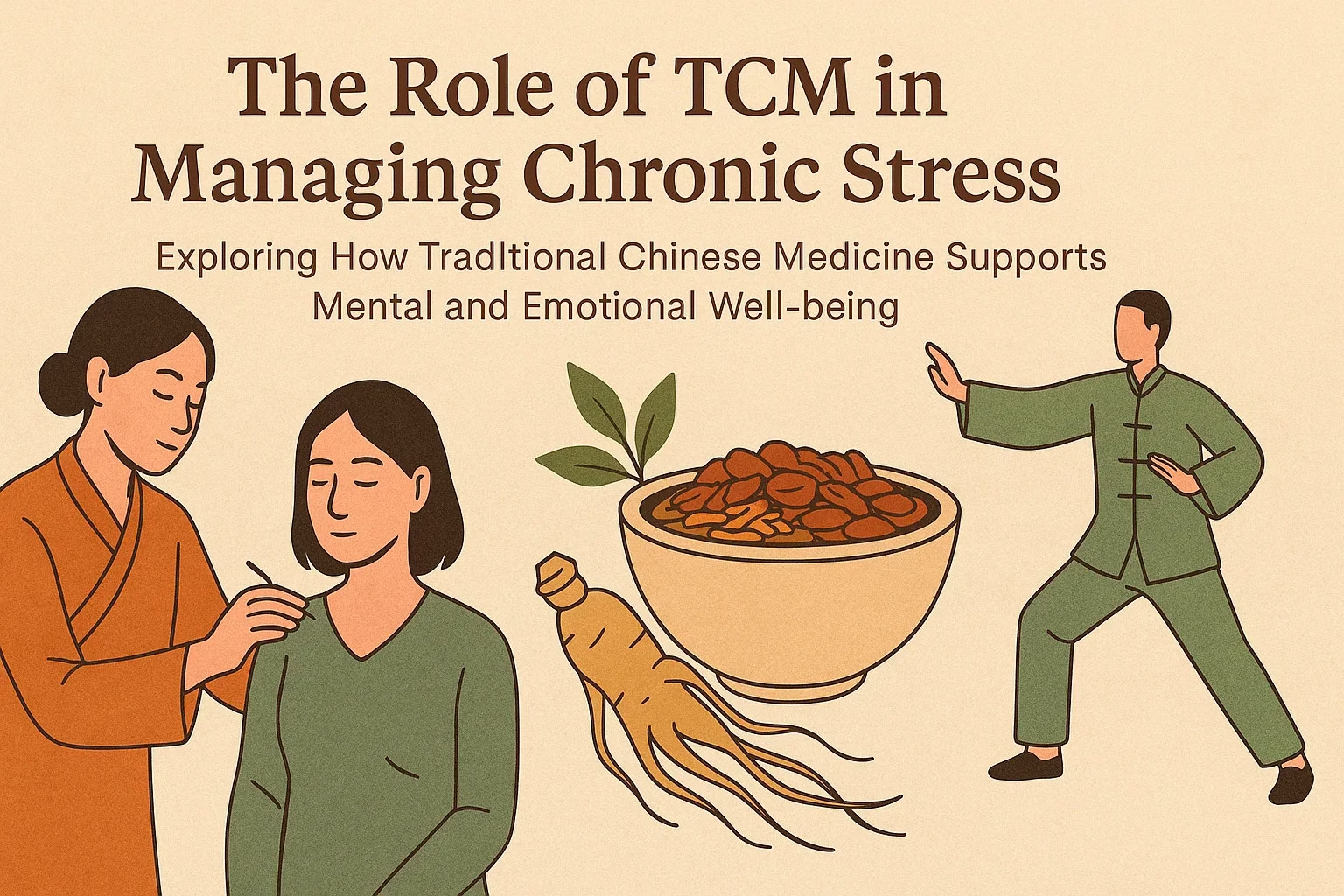In today’s fast-paced world, chronic stress is a leading cause of various physical, emotional, and mental health problems. Conditions like anxiety, insomnia, digestive issues, and even cardiovascular diseases are often exacerbated by prolonged stress. While conventional treatments like therapy and medications are commonly used, Traditional Chinese Medicine (TCM) offers a unique, holistic approach to managing stress.
This article explores the TCM perspective on chronic stress, its impact on the body, and the therapeutic tools TCM offers for stress management, including acupuncture, herbal medicine, Qigong, and lifestyle adjustments.
🔶 How TCM Views Chronic Stress
In TCM, stress is seen as a disruption in the flow of Qi (vital energy), particularly Liver Qi stagnation. The Liver is responsible for the smooth flow of Qi throughout the body, and emotional stress can cause it to become blocked or stagnant, leading to physical and emotional imbalance.
1. Liver Qi Stagnation
When the Liver Qi becomes stagnant due to stress, frustration, anger, or suppressed emotions, it can lead to:
- Headaches and migraines
- Digestive issues like bloating, constipation, or acid reflux
- Irritability, mood swings, and emotional tension
2. Spleen and Stomach Disharmony
Chronic stress can also weaken the Spleen, impairing digestion and causing fatigue, poor appetite, and bloating. The Spleen’s role in transforming food and water is compromised, leading to Qi deficiency and Dampness accumulation.
3. Kidney Yin Deficiency
Stress over long periods can deplete Kidney Yin, resulting in symptoms like:
- Insomnia
- Tinnitus (ringing in the ears)
- Low back pain
- Night sweats
🔶 TCM Approaches to Managing Chronic Stress
✅ 1. Acupuncture for Stress Relief
Acupuncture is one of the most effective TCM tools for managing stress and its effects on the body. By stimulating specific acupuncture points, acupuncture helps to:
- Regulate Qi and release Liver Qi stagnation
- Calm the Shen (spirit), aiding in relaxation and mental clarity
- Enhance blood circulation, improving oxygen and nutrient delivery to vital organs
Common Acupuncture Points for Stress:
- LV3 (Taichong): Moves Liver Qi, relieves emotional tension
- HT7 (Shenmen): Calms the Shen, reduces anxiety and insomnia
- LI4 (Hegu): Relieves pain, balances stress-related symptoms
- PC6 (Neiguan): Eases anxiety, improves circulation
Acupuncture can also regulate the nervous system, reduce cortisol levels, and balance the sympathetic and parasympathetic systems, helping the body relax and return to homeostasis.
✅ 2. Herbal Remedies for Stress Management
Herbal medicine offers specific formulas and individual herbs to calm the mind, boost energy, and restore balance to the body’s internal systems. Some key herbs and formulas used in TCM for chronic stress include:
| Herb/Formula | Function |
|---|---|
| Xiao Yao San (Free and Easy Wanderer) | Relieves Liver Qi stagnation, promotes emotional balance, and reduces anxiety. |
| Suanzaoren (Sour Jujube Seed) | Nourishes the Heart and calms the Shen, especially helpful for insomnia and nervousness. |
| Ba Zhen Tang (Eight-Treasure Decoction) | Tonifies Qi and Blood, strengthens Spleen and Kidney, and boosts energy levels. |
| Ren Shen (Ginseng) | Boosts Qi, increases vitality, and reduces fatigue caused by stress. |
| Dong Quai (Dang Gui) | Nourishes Blood, especially useful when stress leads to mood swings or fatigue. |
Many of these herbs work by nourishing Yin, tonifying the Blood, and improving Qi circulation, which are essential for combating the draining effects of chronic stress.
✅ 3. Qigong and Tai Chi for Stress Relief
Both Qigong and Tai Chi are traditional Chinese practices that combine movement, breathwork, and meditation. They help:
- Promote relaxation
- Calm the mind
- Regulate Qi flow
These practices are particularly helpful in relieving stress by:
- Clearing blockages in the Liver meridian
- Balancing Yin and Yang
- Enhancing energy flow and improving overall health
Studies have shown that regular practice of Qigong can reduce anxiety, lower cortisol levels, and improve mental clarity and physical health.
✅ 4. Dietary Adjustments to Manage Stress
TCM recommends dietary adjustments to support the Liver, Spleen, and Kidney during times of stress. Foods that help:
- Nourish the Blood: Spinach, beets, goji berries, and black sesame.
- Calm the mind: Chamomile tea, sour jujube seeds, and red dates.
- Support digestion: Ginger, cooked vegetables, and whole grains.
Avoiding excessive caffeine, alcohol, and greasy or spicy foods is also important, as they can exacerbate Liver Qi stagnation and increase stress levels.
🔶 Conclusion
Chronic stress is a pervasive issue in modern life, affecting both the body and mind. However, Traditional Chinese Medicine provides a comprehensive, holistic approach to managing stress, offering tools like acupuncture, herbal remedies, Qigong, and dietary adjustments to promote emotional balance and physical well-being.
By integrating these TCM practices into your daily life, you can reduce stress, restore harmony, and improve your overall quality of life.


发表回复